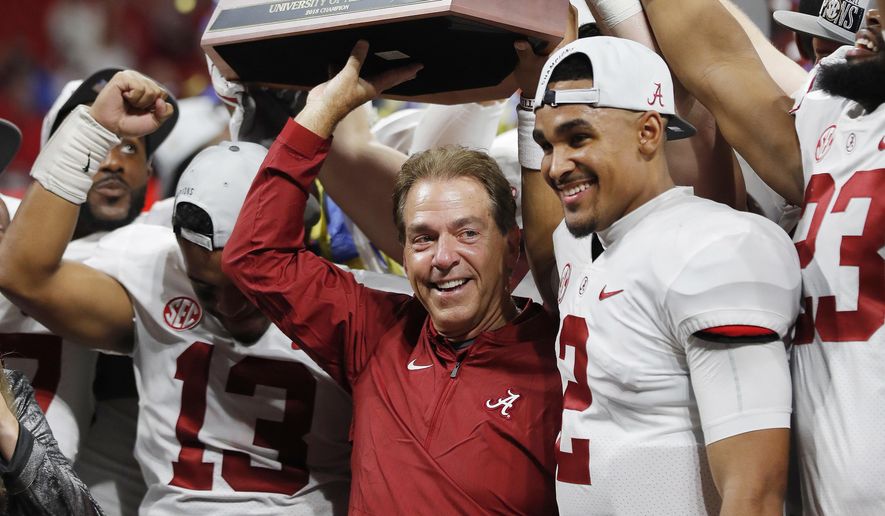Class, character not necessarily linked to stay-or-go decisions

By DERON SNYDER (as published in The Washington Times)
There were questions on whether his current situation was tenable. There was rampant speculation about his next destination. The nagging question became a major issue that engulfed his program.
Would he stay? Would he go?
Then it happened.
Nick Saban left his job as head coach of the Miami Dolphins for the position at the University of Alabama.
At a Dolphins news conference about two weeks prior, Saban was emphatic when pressed on the matter. A reporter noted that the coach had never flatly denied the rumor. “I’m not going to be the Alabama coach,” Saban said.
An eight-year contract worth a guaranteed $32 million apparently changed his mind, perhaps with knowing there’s more where that came from. (His latest deal, announced in July, is for eight years and at least $74 million.)
That’s great for the Saban family.
But how is it that we were supposed to chastise Alabama quarterback Jalen Hurts if he had left Tuscaloosa before this season?
On Saturday, Hurts pulled off one of the most incredible turnarounds in memory, entering the SEC championship in relief and leading the Crimson Tide to a 35-28 comeback win against Georgia. In January – on the same field in Atlanta and against the same opponent – Hurts was benched at halftime and watched as true freshman Tua Tagovailoa led Alabama to the national championship.
Hurts was called upon Saturday with 11:15 remaining and Alabama trailing 28-21. The junior engineered a 15-play, 80-yard touchdown march on his first possession and capped the scoring with a 15-yard run on Alabama’s next drive. For the day, he completed 7-of-9 passes for 82 yards and a touchdown, to go along with 28 yards rushing.
Even Disney would hesitate to greenlight that story.
Tagovailoa was forced out by an ankle injury, totally opposite to last season’s situation when Hurts was benched for poor performance. Considering that Hurts was 26-2 as Alabama’s starting quarterback, it would be understandable if he decided to transfer, especially when Tagovailoa kept the job entering this season.
But Hurt didn’t leave and he didn’t take a redshirt to preserve a season of eligibility. He stuck around as the backup and played few meaningful snaps. Saban said he’s probably never been prouder of a player.
“It’s unprecedented to have a guy that won as many games as he won – start as a freshman, only lose a couple of games the whole time that he was the starter – and then all of a sudden he’s not the quarterback,” Saban told reporters afterward. “How do you manage that? How do you handle that? You’ve got to have a tremendous amount of class and character to put team first, knowing your situation is not what it used to be.”
Other folks gushed over Hurts in similar fashion, noting how the quarterback didn’t pout, didn’t sulk, didn’t finger-point and didn’t take the first flight out of Alabama after losing his starting job.
We need a timeout because we’re confusing two separate issues here.
Here’s the thing: The way Hurts handled his situation – NOT his decision to remain – is the testament to his class and character.
He would’ve been no less classy or demonstrated any less character had he opted to move on.
Sometime after last season’s national title game, Hurts could’ve issued a respectful, heartfelt statement that he was leaving Alabama to pursue another opportunity elsewhere. He could’ve expressed his love and appreciation for his teammates, coaches and Alabama fans, declaring that they’d always have a special place in his heart. He could’ve gone to his next school and still epitomized hard work, commitment and unselfishness.
Leaving wouldn’t have been a telltale sign of moral deficiency, no more than it was when you left your last job.
Hurts has exhibited exceptional character because that’s part of who he is. It wouldn’t have been diminished if he departed.
“I told coach Saban everything happens for a reason,” Hurts said Saturday. “That’s been a thing I tell him all the time.”
He didn’t have 32 million reasons to change team colors like Saban did in January 2007. But Hurts had good reason to transfer if he chose to do so. He also saw good reasons to stay, acknowledging that one’s position on the depth chart isn’t necessarily a deal breaker.
That’s a refreshing point-of-view and we don’t see very often.
Just don’t twist it into a weapon and bludgeon others who take the opposite path.
What’s good for coaches, administrators, CEOs, secretaries and custodians – i.e., the ability to make career moves that aren’t litmus tests on their integrity – should be good for college athletes, too.
— Brooklyn-born and Howard-educated, Deron Snyder writes his award-winning column for The Washington Times on Tuesdays and Thursdays. Follow him on Twitter @DeronSnyder.
 Follow
Follow
